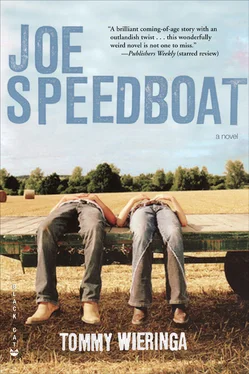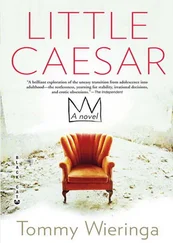‘OK,’ Engel said, ‘now we can put the canvas on it.’
Each new phase in construction was preceded by a rash of thievery. What was needed now was tarpaulin.
‘Blue tarp, and nothing but blue,’ emphasized Engel, who was in charge of the plane’s aesthetics. ‘Sky blue or nothing at all.’
The stands for the Friday street market were always set up the night before, the tarps laid in readiness on the tables where the stallholders could find them the next morning. But one Friday morning in October the market superintendent found himself besieged by a group of unhappy vendors. Where were their tarps? How were they supposed to set up their stands? Was this what they paid stallage for? That day they were given last year’s ratty old tarps, and that week’s Lomarker Weekly ran a little article about the theft.
Meanwhile, at a secret location, the tarps were sewn together with angelic patience. Engel was the right man for the job; his father, the last of the Lomark eel fishers, had taught him how to mend fish traps and tie knots that would never come loose. Engel cursed regularly as he worked, but the final result was stunning. Using tie-rips, he stretched the tarps over the fuselage until they were tight as the head of a drum.
Joe was in charge of the wings. The frames were made from fourteen aluminium strips attached to the main girder of each wing, which presented the difficult task of bending twenty-eight ribs into exactly the same silhouette. Without being asked, I took over right away; a strong hand that knows its own strength is a more delicate instrument than any bench-vice or pair of tongs. Taking each rib between thumb and fingers, I bent them to the right curvature. Twenty-seven and one for good luck makes twenty-eight, there you go, sir.
They were flabbergasted.
‘Jesus, talk about a vice-grip,’ Engel mumbled.
‘Frank the Arm,’ said Joe.
From then on I was called on more often when it was time to bend things or to tighten them so they’d never move again.
At Pa’s yard they tore an aluminium engine out of a pleated Subaru and installed it in the nose of the plane. The fuel tank was the kind used in small boats. The plane, they had calculated, needed to produce 130 kilos of pull in order to get off the ground. A weigh beam was attached to the wall and linked to the tail with a steel cable. Joe climbed in and started the engine. Holy Toledo, it ran like a dream. The cable went taut, the pointer on the weigh beam shot up to eighty kilos, then ninety. The propeller flailed, one hundred, the motor roared and papers flew through the shed. Wednesday left my shoulder with a panicky caw-caw, at a hundred and ten Engel put his hands over his ears, the engine was approaching 5500 rpm and making a horrible racket.
‘HUNDRED TWENTY!’ Christof screamed.
The pointer kept crawling along, Joe gave it a tad more throttle and Engel shouted, ‘STOP!’
A hundred and thirty kilos of traction: the plane had passed the test.
One day Joe asked me to help him with a little experiment. He rolled me over to the workbench in the hangar, then sat down on the other side. The workbench Engel used for his drawings was between us. Taking my right hand in his he moved our elbows to the middle, so that our forearms formed sixty-degree angles with the tabletop. In one quick move Joe pushed my arm down, making me lean over crookedly in my cart. He brought my arm upright and pushed again, but with less force this time, so it took longer for me to tilt over. The back of my hand touched the tabletop. I looked at him, wondering what it was he wanted from me. He set me upright again.
‘Put a little muscle into it this time,’ he said.
I put a little muscle into it. So did he. We sat there across from each other like that for a while. Then he threw his shoulder into it and pushed harder. I didn’t budge, he pushed harder and his eyes bulged. I gave a little.
‘Put some muscle into it, damn it!’ he groaned.
I buckled down and brought our hands back to the middle of the table.
‘Push!’
I pushed him down. He groaned and let go.
‘Was that difficult?’ he asked.
I shook my head.
‘A little bit difficult?’
Not very difficult. Joe nodded contentedly and got up. He went out of the shed and came back with a couple of rusty iron bars under his arm. The bars were of different thicknesses; he clamped the thinnest one between the jaws of the bench-vice at the end of the table.
‘Bear with me here, Frankie,’ he said, and rolled me over to the bench-vice. ‘Now, can you bend that?’
I grabbed the bar and bent it. Joe put the next one in the vice. This one was thicker. When I bent it back at an angle I didn’t feel much resistance, but the dent of the iron still glowed hot in my hand. Bending things felt good.
Joe fastened the final bar in the vice. It was a lot thicker than the first two. I wrapped my fingers around it and pulled, but the bastard wouldn’t budge. I went at it, I didn’t want to disappoint Joe. A weird noise came from my throat, I pulled like my life depended on it, but nothing much happened. What I did hear was the sound of breaking glass, and metal clattering against stone. Then it gave — it came slowly in my direction. What was that running out of my nose; was it blood or snot?
‘Whoa, big fella!’
I let go and, to my surprise, the bar sprang back like elastic. There was a loud crash. I groaned in disappointment: the iron hadn’t bent, it was only the other side of the workbench lifting off the floor — the sound I’d heard was falling beer bottles and tools. I had failed.
‘Fantastic,’ Joe said, ‘really fantastic. Do you have any idea how much that bench weighs?’
He squatted down beside me. His face was close to mine, he didn’t blink, and I noticed that his left eye shone differently from the right one — the left eye was shooting fire, tempered in turn by the right one, which held a sort of compassion greater than I could grasp.
‘That arm of yours might take you places,’ he said. ‘Keep it in good shape, you never know.’
It was winter, the river left its banks. Around Ferry Island the current rose, and metre by metre the washlands disappeared beneath grim, sloshing water.
Then the Lange Nek went under, and before long only the traffic signs, lampposts and trees still stuck out above the water. Piet Honing brought the ferryboat to safety in a quiet inlet a ways north and ran the service between Lomark and Ferry Island with the amphibian that belonged to Bethlehem Asphalt.
Every morning and every evening the shivering asphalt men waited for him, the managers with their attaché cases and the workers with lunchboxes in hand. Most of the asphalt men were on bad-weather leave, though; once it was no longer possible to travel by regular means between Ferry Island and the shore, production had halted. Repairs and administrative work were all that went on. Piet Honing steered standing at the back of the amphibian and didn’t mind the cold — his face had that leathery texture that weathers but doesn’t wear out with the years.
In winter the inhabitants of Ferry Island, like Engel and his father, became real islanders. They did enough shopping in Lomark to last them a week, then locked themselves away in their restored isolation. The island used to be full of real anarchists, radical folk who drank potato moonshine and hunted hares with impunity, for the arm of the law wasn’t long enough to cross the water. They were notorious for smacking each other over the head at the slightest provocation. That’s all changed, though, people aren’t like that anymore. They’ve grown tame. Everyone can afford a bottle of store-bought gin, and when you see them out walking their dogs you wonder who’s been domesticating whom.
Читать дальше












